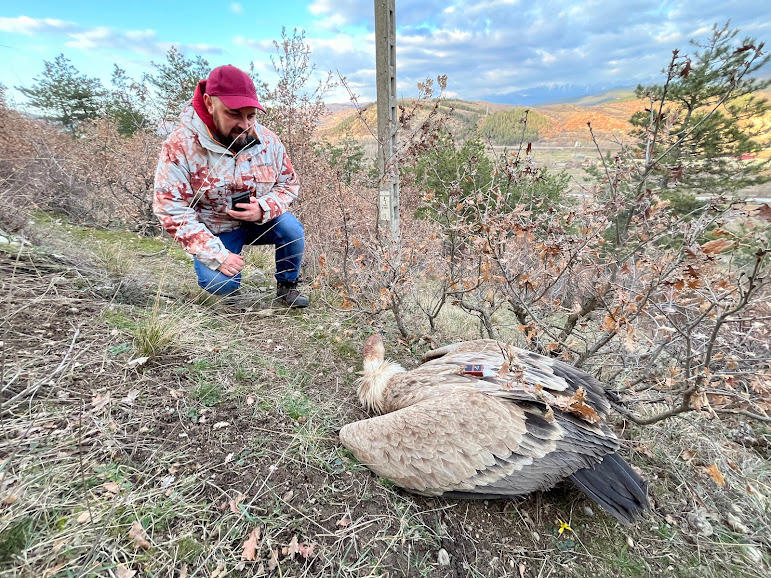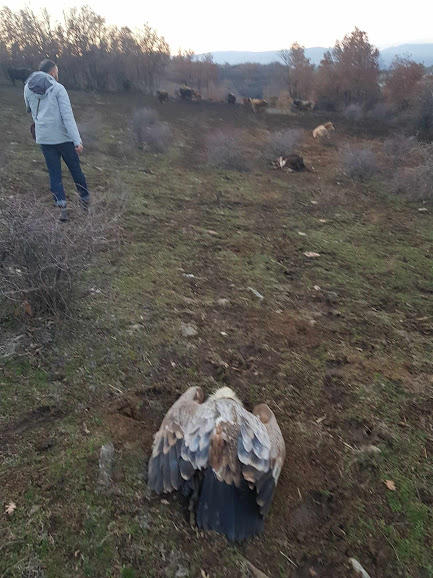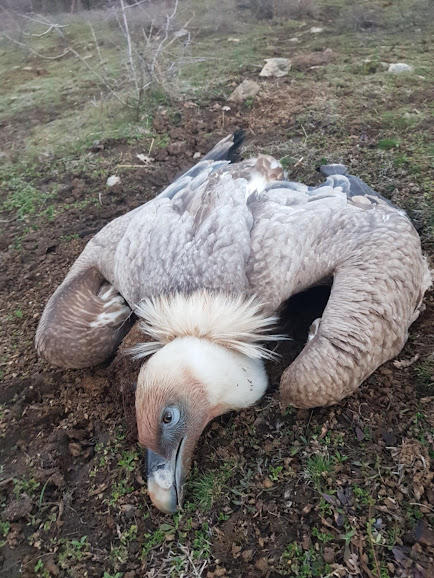A new case of intentional poisoning of griffon vultures has been identified near Simitli
04 Mar, 2025 | 18:12
- Two dead birds have been found, there are data on 4 more in distress. The forecast is that the losses will reach about 15 specimens.
A new case of intentional poisoning of specimens of the protected species of griffon vulture has been established near Simitli. On March 3 in the afternoon, the team of the non-governmental organization Fund for Wild Flora and Fauna (FWFF) received a signal about a distressed griffon vulture (Gyps fulvus) near Simitli, Blagoevgrad region. On site, the organization's experts determined that it was an adult bird from the griffon vulture colony in the Kresna Gorge, and the observed behavior of the bird suggested poisoning. The bird was caught and transported for veterinary medical assistance in Blagoevgrad.
Due to the assumption of the use of poisons or poisonous baits in nature by the FWFF, an immediate examination was carried out of all GPS transmitters in the internet panel, where the movement and behavior of the specimens is monitored. The team found that there was a second distressed, but still alive, Griffon vulture between the villages of Cherniche and Simitli. This bird was found alive, but in a distressed state, with traces of feeding. The FWFF team checked the data from the transmitter and found that the bird had landed and stayed for a long time near a farm in the village of Moshanets, Blagoevgrad Municipality. Both specimens were immediately given atropine (an antidote used in acute poisoning).
In the village of Moshanets, at the place where the second distressed vulture had landed, the remains of a cow were found, and two more, but already dead, specimens were discovered nearby, about 10 and 50 meters away, respectively.
The team of the Wild Flora and Fauna Fund immediately reported the incident to 112. The Ministry of Environment and Water and the organization reported the Crimes Against the Environment and Wildlife Sector to the General Directorate of the National Police (GDNP) at the Ministry of Interior, and instructions were given on what actions to take on site.
On 03.03.2025, in the dark of the day, three different teams went to the site - a police patrol, an investigator, representatives of the inspectorate of the Municipality of Blagoevgrad, as well as the Bulgarian Food Safety Agency (BFSA). The teams inspected and took samples from the found animal carcasses. The cow's carcass was removed, the terrain was secured in order to prevent subsequent poisoning of protected and other animal species.
The FWFF has intensified the monitoring of all other vulture transmitters in the area - currently there are data on two more poisoned griffon vultures, bringing the total number of affected birds to six.
The case is similar to that of 2017, when for two weeks the teams of non-governmental organizations working with vultures in Bulgaria could not find the poisoned bait (again a whole cow carcass). This led to the gradual destruction of over 40 griffon vultures. What is unusual now is that the cow carcass used for bait is in the middle of an enclosure with an electric fence, where there are other cows and calves.
The Ministry of Environment and Water expresses hope that the damage from the loss of griffon vultures will be limited. The FWFF estimates that the losses may reach about 15 specimens of the species. Experts base their expectations on the well-developed early warning system, GPS transmitters and the approved "National Action Plan for Combating the Illegal Use of Poisons in Wildlife 2021-2030", as well as on the international training of specialists from the police and the prosecution in the country.
We would like to draw your attention to the fact that during the breeding season that has already begun this year, there has been a record number of new pairs in the Kresna Gorge - 11 birds that have already bred and at least 3 more pairs preparing their nests. This is 4 more than in 2024, however, the damage has yet to be determined and several clutches will probably be compromised due to the loss of at least one of the partners in the pairs.
The griffon vulture is recovering in Bulgaria, including in the Kresna Gorge region, through targeted efforts to reintroduce the species, with the import of specimens from Spain, France, and Israel. Construction of aviaries, release into the wild, observation, tracking with GPS transmitters, marking and ringing, nest protection, prevention in local communities against the use of poisons, provision of safe feeding grounds are being undertaken.
The current incident is still of unclear scale, but it is certain that it represents an irreparable loss of specimens of a protected species for which many years of efforts and financial resources have been invested in its recovery in the country. This includes LIFE projects funded by the European Union, implemented and/or funded by numerous national and international conservation and scientific organizations.
The griffon vulture (Gyps fulvus) is included in Annex No. 3 to Art. 37 of the Biodiversity Act, and the species is marked with an asterisk (*), i.e. the provisions of Art. 278e of the Criminal Code apply to it. Since there is a colony of griffon vultures in Kresna, and given that the species feeds on carrion, it is highly vulnerable to the setting of poisoned baits for predators.
- Additional information on the recovery of the griffon vulture in Bulgaria
This year, the Ministry of Environment and Water is funding fencing and securing sites for safe feeding of vultures under the procedure for the selection of project proposals BG16FFPR002-3.011 - Implementation of measure 70 of the National Framework for Priority Actions for NATURA 2000 under priority 3 "Biodiversity" of the Environment Programme 2021-2027 in order to improve the condition of the protected bird species of Black Vulture (A079 Aegypius monachus), Bonelli's Eagle (A404 Aquila heliaca), Griffon Vulture (A078 Gyps fulvus), Egyptian Vulture (A077 Neophron percnopterus). The project includes feeding in existing sites in the protected areas of the NATURA 2000 network and is implemented with a grant with a total value of of 5.134 million BGN.
Organizations engaged in conservation and restoration activities:
FWFF, SNC "Green Balkans", Vulture Conservation Foundation (VCF), Junta de Extramadura and EuroNatur, BIOPARC Zoo de Doue and Sainte Croix Zoo (France), Nickelson Trust (Ireland), Deutche Bundesstiftung Umwelt (DBU), Frankfurt Zoological Society (FZS), Foundation Ensemble, Rufford Small Grants (RSG), Whitley Fund for Nature (WFN), Black Vulture Conservation Foundation (BVCF), EAZA Carnivore initiative, GREFA and Spanish Government, Hegalaldia Wildlife Center, French Government, Bioparc Zoo de Doue, Zoo Mulhouse, Zoo Sainte Croix, Paris Zoo, Barcelona Zoo.


